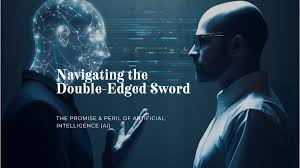Technology
Featured
The Double-Edged Sword: As AI Permeates Society, a Reckoning Over Ethics and Governance Is Underway
Editor
Jun 20, 2025
min read
4 views

Artificial intelligence is no longer a futuristic concept; it is a pervasive and powerful force reshaping every facet of modern life. In 2025, the rapid proliferation of AI technologies – from generative models that can create stunningly realistic text and images to sophisticated algorithms that are making critical decisions in fields like finance, healthcare, and justice – is forcing a global reckoning over the profound ethical and governance challenges they present. While the potential benefits of AI are immense, from accelerating scientific discovery to boosting economic productivity, there is a growing sense of urgency to establish robust frameworks that ensure these technologies are developed and deployed safely, ethically, and equitably.
One of the most visible manifestations of the AI revolution is the rise of generative AI. Platforms like ChatGPT and DALL-E have captured the public imagination, but they have also raised a host of complex issues. The potential for these technologies to be used to create and disseminate misinformation and disinformation at an unprecedented scale is a major threat to democratic societies. The recent use of deepfake technology in political campaigns has provided a sobering glimpse of what is at stake. There are also thorny questions around intellectual property and the ownership of AI-generated content. Artists and writers are increasingly concerned that their work is being used to train AI models without their consent or compensation, leading to a wave of lawsuits against major tech companies.
Beyond generative AI, the use of algorithms in high-stakes decision-making is another area of intense scrutiny. In the criminal justice system, AI-powered tools are being used to predict the likelihood of recidivism and to inform sentencing decisions. However, there is growing evidence that these algorithms can perpetuate and even amplify existing biases, leading to discriminatory outcomes for minority and marginalized communities. In healthcare, AI holds the promise of revolutionizing diagnosis and treatment, but there are also concerns about patient privacy, the reliability of AI-driven medical advice, and the potential for algorithms to exacerbate health disparities. The black box nature of many of these systems, where even their creators cannot fully explain how they arrived at a particular decision, further complicates the challenge of ensuring fairness and accountability.
In response to these challenges, there is a growing global movement to regulate AI. The European Union has taken the lead with its landmark AI Act, the world's first comprehensive law on artificial intelligence. The Act takes a risk-based approach, imposing strict requirements on 'high-risk' AI systems, such as those used in critical infrastructure or law enforcement. The United States has also taken steps to address the risks of AI, with the White House issuing an executive order on AI safety and the National Institute of Standards and Technology (NIST) developing an AI Risk Management Framework. However, the pace of technological development is far outstripping the pace of regulation, and there is a vigorous debate about the right balance between fostering innovation and protecting the public interest.
The private sector also has a critical role to play in the responsible development of AI. Many of the leading AI companies have established their own ethics and safety teams, but there are questions about their effectiveness and independence. The immense commercial pressures to be the first to market with new AI products can sometimes clash with the need for caution and rigorous testing. There is a growing call for greater transparency from tech companies about how their AI systems are built and trained, as well as for independent audits to assess their safety and fairness.
The societal impact of AI on the future of work is another major area of concern and debate. While AI is expected to create new jobs and to augment human capabilities in many professions, it is also likely to displace a significant number of workers, particularly those in routine and repetitive tasks. This raises fundamental questions about the need for new social safety nets, investment in retraining and upskilling programs, and a broader societal conversation about the value of work in an age of increasing automation. Some are even proposing more radical solutions, such as a universal basic income, to cushion the impact of this technological transition.
As we navigate this new technological frontier, one thing is clear: the development of artificial intelligence cannot be left to the technologists alone. It requires a multi-stakeholder dialogue involving governments, industry, academia, and civil society. It requires a deep and nuanced understanding of both the potential and the perils of these powerful new tools. And it requires a shared commitment to harnessing the power of AI not just for profit or for power, but for the betterment of all humanity. The choices we make today about the governance of AI will have a profound and lasting impact on the shape of our society for generations to come. The reckoning is here, and the stakes could not be higher.
Editor
League Manager Editorial Team





Leave a Comment